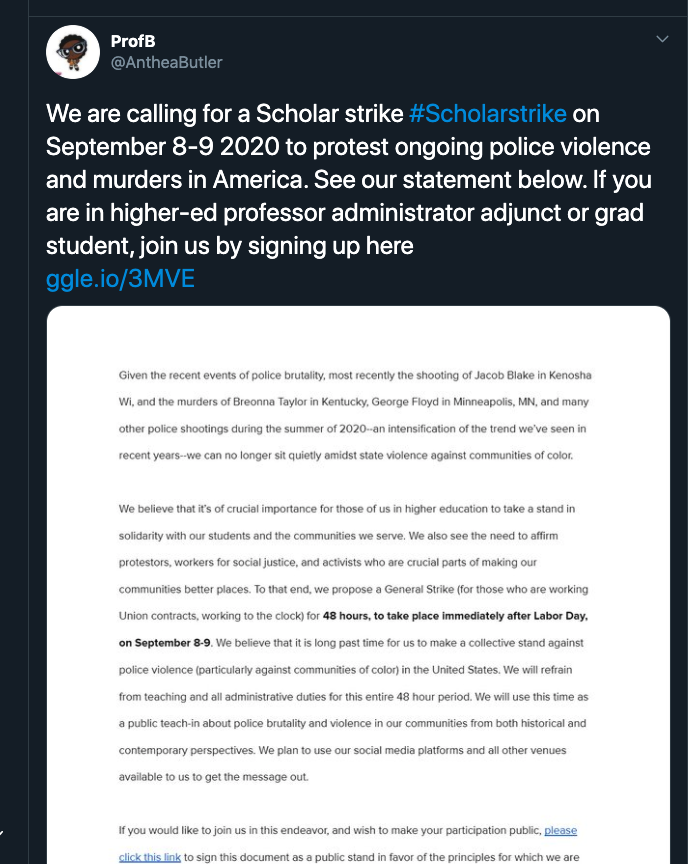#Scholarstrike began to go viral on Twitter as faculty and professors like Anthea Butler from the University of Pennsylvania spoke out on the two-day event slated for Sept. 8-9.
By Robert Rios, Campus Editor
America’s ongoing racial reckoning is not skipping the campus of California State University, Dominguez Hills, virtual semester or not.
Today, the first in a series of virtual events examining anti-racism, as well as to ensure all students feel welcome at the university, will take place from 10 a.m. to noon. And next week, #Scholarstrike, a two-day event launched on Twitter, may manifest in some CSUDH virtual classrooms.
Today’s event “It Takes a Village, Black Lives Matter Healing & Solidarity” will include breakout sessions, healing and solidarity sessions and representatives from the college administration (President Thomas A. Parham), faculty (Academic Senate President Laura Talamante), student government (ASI President Rihab Shauab), the Africana Studies Department (Christian Green), the psychology department (Monique Turner), and Catherine Jermany, program director of the Rose Black Resource Center.
Jermany created some general guidelines that participants who sign up for the event receive, including, “speak from your own experience; be open to learn something new; challenge ideas, not people, and challenge your open ideas as well as others.”
While not directly related to next week’s #Scholarstrike, the two are linked in terms of showing solidarity with the Black Lives justice movement, as well as education. #Scholarstrike didn’t exist until Aug. 26, when a single Tweet from a Pennsylvania professor launched it.
“I would be down as a professor to follow the NBA and Strike for a few days to protest police violence in America,” Anthea Butler, associate professor of Religious studies and Africana studies at the University of Pennsylvania, tweeted, referencing the walkouts staged by NBA teams in the aftermath of Jacob Blake’s death.
The event’s organizers are calling for faculty across their country to withhold their labor in order to bring attention to violence against people of color.
Once the tweet went viral, the term, #ScholarStrike began circulating throughout the web. With help from Butler’s co-organizer, historian Kevin Gannon, director of the Center for Excellence in Teaching and Learning at Grand View University, more than 600 professors across the county had committed to the cause within hours.
“We’re not so much protesting our individual universities, as we are protesting police violence and racial injustice in this country,” said Butler.
The event’s organizers are calling for faculty across their country to withhold their labor in order to bring attention to violence against people of color. However, while some faculty might not show up, virtually or otherwise, #Scholarstrike is meant to be more of a teaching moment, Teachers and professors are advised to speak with students on the issues of violence that may be affecting their community.
“Scholars have knowledge,” said Butler. “And so part of what we want to do is not only to strike but to do a teaching and allow others to conduct their own teachings.”
At CSUDH, Dr. Ximena Cid, department chair of the Physics department, sent an email to all faculty Monday morning, sharing #Scholarstrike information.
“If you were aware of the #shutdownstem and #strike4blacklives #strikeforblacklives movements that happened over the summer (https://www.particlesforjustice.org/,https://www.shutdownstem.com/, https://www.vanguardstem.com/) this is a similar thread,” Cid wrote. “ Some of the same organizers are part of this same movement.”
In an email distributed yesterday, the California Faculty Association—which is precluded from striking or supporting an actual faculty work stoppage as part of the current collective bargaining agreement — threw its support behind the idea, suggesting its members teach classes, but “refrain from other work in order to bring focus to the time we’re living in.”
Resources for faculty interested in holding these “teach-ins,'” can be found here.
At least one professor at CSUDH will absolutely participate in #ScholarSTrike.
Mara Lee Grayson , an assistant professor in the English department and the director of the CSUDH Writing Center, has already spoken out on the matter and will participate with her class with a teach-in.
“By lending support for this effort, CSUDH has the opportunity to take a stand that aligns with our mission and become a national voice in antiracist education,” said Grayson.
Grayson currently teaches race, racism, and racial literacy in writing studies. She will speak with her students on what actions to take and how to transform their, “knowledge into practice both inside the classroom and outside the classroom.”
“As a teacher and scholar of antiracist education, it is imperative that my actions match my words and that I model for students what antiracist praxis looks like,” said Grayson.

